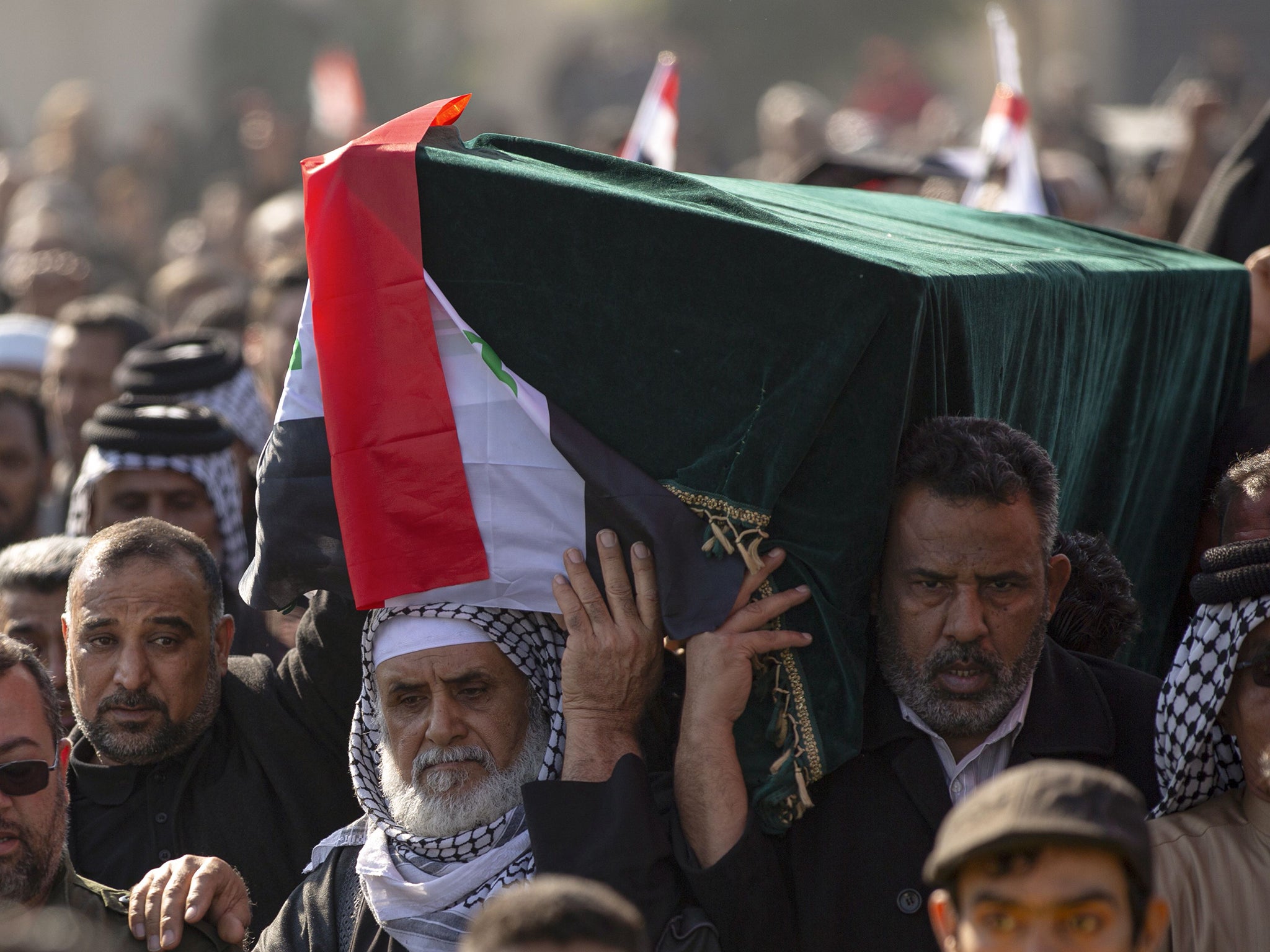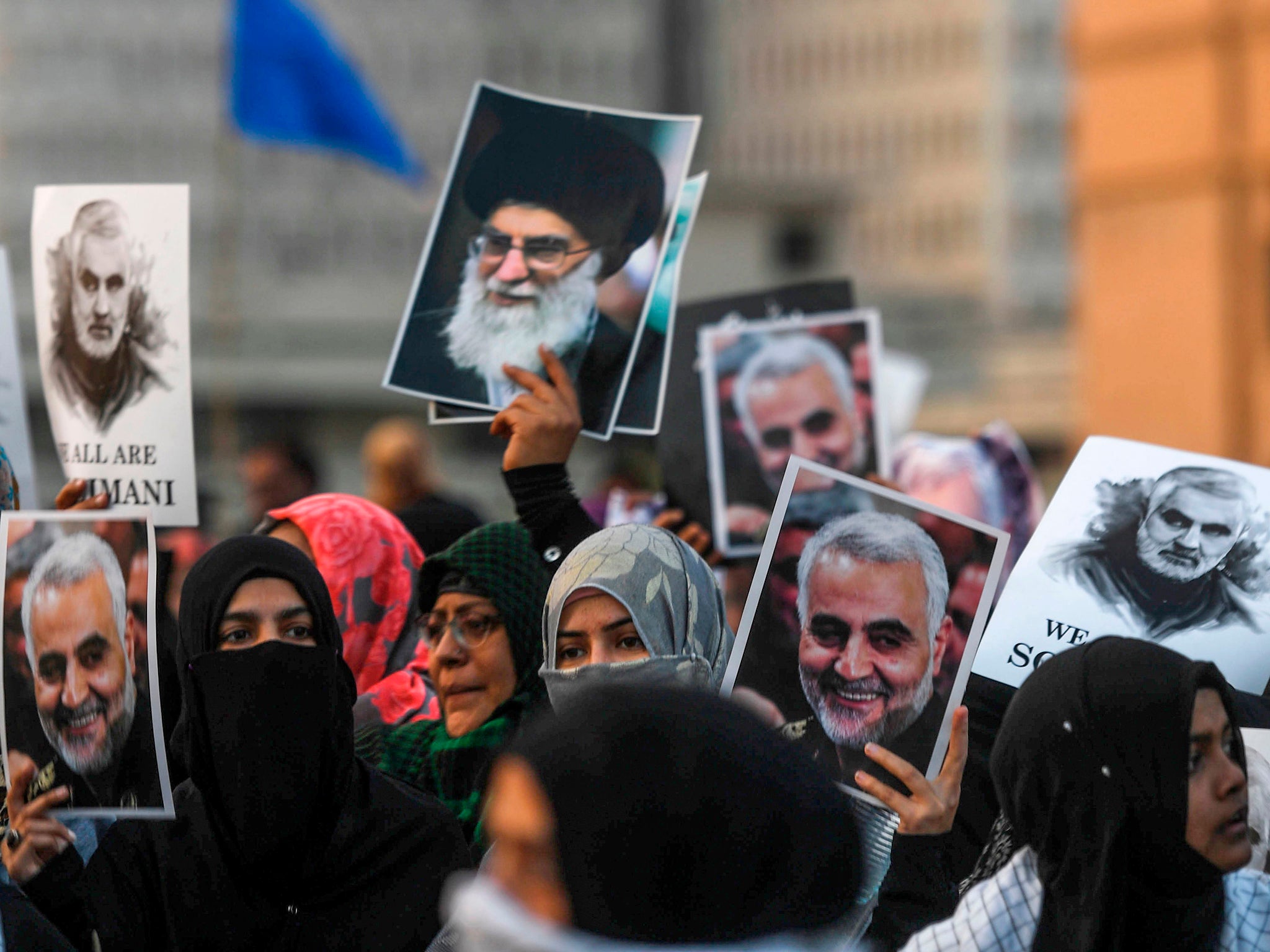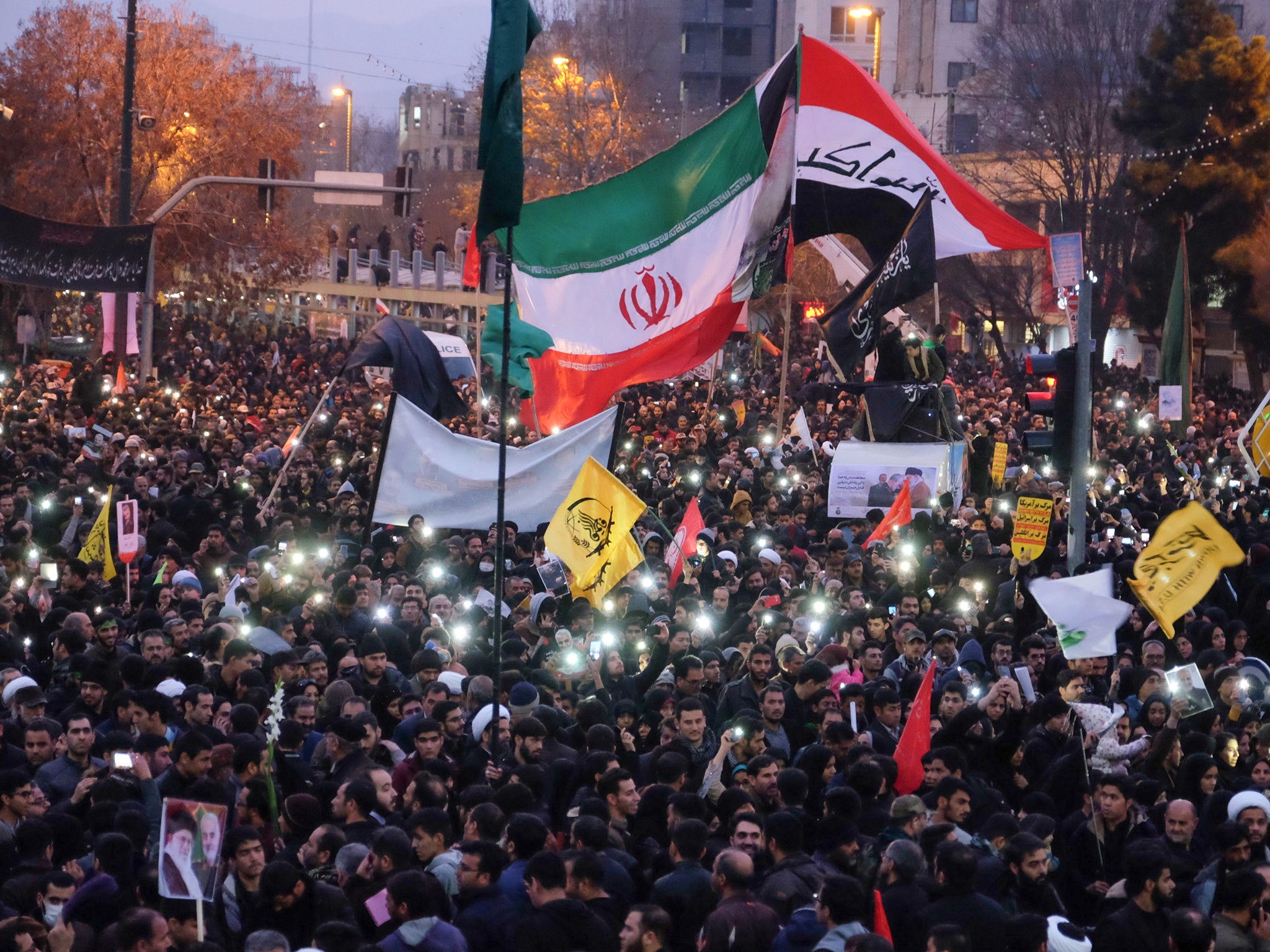Iran abandons nuclear deal commitments as Iraq parliament votes to expel US troops
In statement broadcast on state TV, government said it would not respect restrictions on uranium enrichment
Iran has said it will no longer abide by any limits of an international nuclear deal after the US assassination of top general Qassem Soleimani.
In a statement broadcast on state TV, the government said it would no longer respect restrictions on enrichment of uranium, or research and development, representing another major blow to any hopes of restoring relations between Washington and Tehran on a day that saw hundreds of thousands take to the streets of cities and towns across Iran to mourn Soleimani and demand retaliation.
The announcement marks the most serious blow yet to the 2015 accord, agreed between Iran and a group of world powers known as the P5+1 - the US, UK, France, China, Russia and Germany - that aimed to prevent Tehran from building an atomic weapon by imposing restrictions on its sensitive nuclear activities and allowing inspections by international experts in return for the lifting of economic sanctions.
It was considered a triumph by the Obama administration after years of tension over Iran's nuclear capabilities and intentions, but President Trump abandoned the deal in May 2018 in favour of a policy of 'maximum pressure' against Tehran, with crippling sanctions against its financial and oil sectors.
The other parties disagreed and tried to keep the deal in place, but the new US sanctions undermined the accord and its credibility was gradually eroded.
The announcement came hours after Iraq’s parliament voted to oust US and other foreign troops fighting Isis, delivering a blow to efforts to fight the jihadi group following Washington’s decision to assassinate Soleimani in an airstrike.
Iraq’s parliament convened and quickly passed the preliminary vote not only for the removal of foreign troops but also to submit a complaint to the United Nations against the US for violating the country’s sovereignty, marking a nadir in relations between Washington and Baghdad – where the airstrike took place in the early hours of Friday.
“Despite the domestic and international challenges that we may face, this choice remains the best for Iraq,” Iraq’s caretaker prime minister, Adel Abdul Mahdi, told lawmakers.
“Iraq lived without foreign forces in the period between 2011 and 2014 and its relationship with the US and any other party did not deteriorate.”
US forces in Iraq issued a statement saying they had “paused” anti-Isis efforts over the tensions with Iranian-backed forces a day after Nato nations declared they were pulling all troops out of the country.
A pullout of US and other international troops currently training and providing support to Iraqi forces could jeopardise efforts against Isis remnants attempting to stage a comeback. The group took over a third of the country during the three-year period when US troops were absent, sacking the number two city of Mosul after Iraqi forces crumbled.
The UK government urged Iraq to allow soldiers to remain in the country to continue the fight against Isis to stop any resurgence by the terror group.
Some 400 UK troops are stationed in Iraq to counter the threat from Isis, while the US has 5,200, prompting fears that a withdrawal could seriously harm the battle against the extremist group.
The Ministry of Defence was believed to be waiting for the decision of the Iraqi government before taking action over the soldiers, based there as part of a US-led coalition.
"We urge the Iraqi government to ensure the coalition is able to continue our vital work countering this shared threat," a MoD spokesperson said.
The killings, ordered by Mr Trump in response to attacks on US sites in Iraq by Iranian-backed militias, have roiled the already volatile Middle East and upped preparations for a long-dreaded war as diplomats frantically sought to defuse the crisis.

The bodies of Soleimani and Iraqi militia leader Abu Mahdi al-Mohandes were transported to the Iranian eastern shrine city of Mashhad on Sunday for burial.
Video footage showed thousands of emotional, grieving Iranians swarming around a white truck carrying their bodies through the centre of the city in scenes reminiscent of the death of Iran’s revolutionary founder, Ayatollah Ruhollah Khomeini, some three decades ago.
Mashhad is the city where a late 2017 uprising against the government that turned into a nationwide series of protests began. Soleimani, a pillar of the establishment, was celebrated even in anti-regime hotspots gripped only weeks ago by protests demanding political change.
Earlier video footage from a helicopter showed a lengthy procession of Iranians dressed in black gathering stretched along a long boulevard through the streets of central Ahvaz, capital of a largely ethnic Arab southwestern Iranian province that has been the scene of scores of anti-government protests since late 2017.
City officials renamed Ahvaz’s international airport after the “martyr” Soleimani.
The commander of Iran’s clandestine overseas service was regarded as a popular figure in Iran, credited by many for helping to defeat Isis and respected for publicly declining to use his celebrity to pursue political office.
It remains unclear whether his killing will quell the nascent movement against the regime that Washington hawks who have Mr Trump’s ear had been counting on to topple it.
But for now, few inside Iran were speaking of the economic troubles that had sparked an uprising in November that left scores of people dead, as Iranian officials and some segments of the public sought revenge, and officials spoke of war.
As Iran’s parliament opened, scores of Iranians lawmakers who gathered for an emergency session waved their fists in the air and chanted “Death to America”.

But Iranian leaders also went out of their way to insist they did not seek to harm American citizens.
Iranian leaders appear to have a sophisticated understanding of US domestic political issues, and state media has highlighted comments by Democratic Party officials criticising Trump’s Iran policies, including his decision to abruptly abandon the nuclear deal with Iran that had been forged by his predecessor.
“We have zero problems with the American people,” Hesameddin Ashena, an adviser to President Hassan Rouhani, wrote on Twitter. “We even achieved deals with previous US administrations. Our sole problem is Trump. In the event of war, it is he who will bear full responsibility.”
One hardline Iranian lawmaker, Abolfazl Aboutorabi, said that Iran “can attack the White House itself”, in retaliation for the killing. “We can respond to them on American soil,” he was quoted as saying.
But more senior Iranian officials sought to place limits on any response, even after Mr Trump threatened to destroy 52 Iranian targets including cultural sites important to Iranian people in a bizarre and angry tweet on Saturday.

“The response will definitely be military and against military sites,” Hossein Dehghan, a military adviser to Iran’s supreme leader, Ali Khamenei, told CNN. “It was America that started the war. Therefore they should expect appropriate reactions to their actions.”
In a speech from Lebanon broadcast on television, Hezbollah leader Hassan Nasrallah, a staunch ally of Iran and close friend of Soleimani, threatened US troops but cautioned against any attacks that would harm American civilians.
“When the coffins of American soldiers and officers begin to be transported ... to the United States, Trump and his administration will realise that they have really lost the region and will lose the elections,” he said, adding US civilians in the region “should not be touched” because this would serve Trump’s agenda.
Iranian hardline lawmaker Mojtaba Zonnour said: ”If they target our cultural centres, we will hit their vessels and their bases.”
Diplomatic attempts to defuse the crisis continued. Oman, an Arabian peninsula nation with strong ties to both Iran and the US, urged the countries to turn to diplomacy.

Russia and China, both permanent veto-wielding members of the United Nations Security Council, issued a statement condemning the US assassination and cautioning that “military adventurism is unacceptable”, according to the Xinhua news agency.
Mr Dehghan, speaking to CNN, suggested that US restraint in the face of a face-saving Iranian counter-response could prevent the outbreak of a widespread armed conflict. “The only thing that can end this period of war is for the Americans to receive a blow that is equal to the blow they inflicted,” he said. “Afterward, they should not seek a new cycle.”
Join our commenting forum
Join thought-provoking conversations, follow other Independent readers and see their replies
Comments
Bookmark popover
Removed from bookmarks